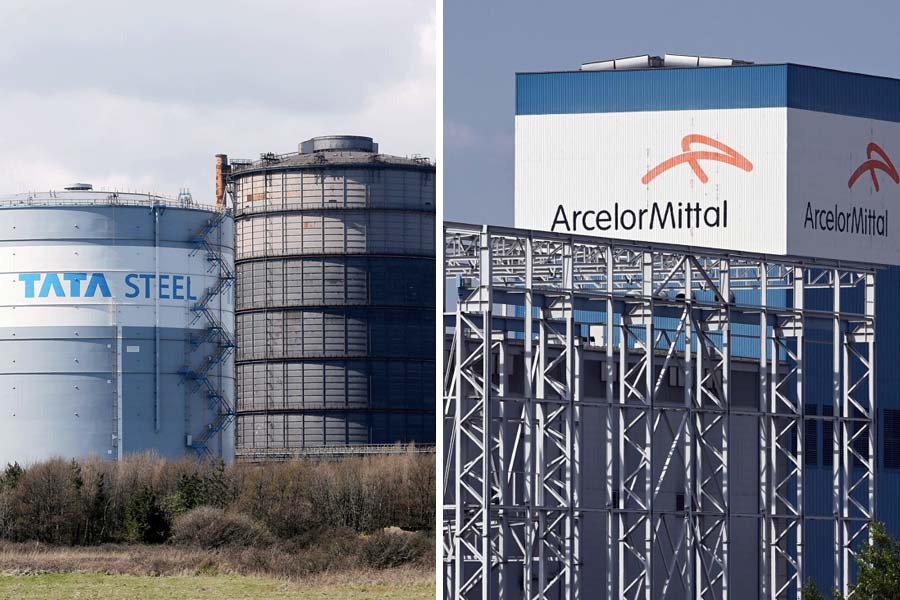Two Indian steelmakers, Tata Steel and Lakshmi Mittal’s ArcelorMittal, are feeling the heat in the UK and Italy from hot-button environmental issues.
Loss-making Tata Steel is shutting its two coal-fired blast furnaces at its Welsh steelworks and axeing nearly 3,000 workers as it shifts to greener, cheaper steelmaking. ArcelorMittal’s debt-laden Italian steelworks, accused of spewing cancer-causing chemicals, faces a government takeover.
In the UK, top politicians have reacted with dismay to Tata Steel's decision to close its two coal-fired blast furnaces in the town of Port Talbot which grew up around the steelworks. The plan will put around 2,800 employees out of jobs by the end of 2024. But Tata Steel. which employs 4,000 workers totally at the Port Talbot site, says the move is aimed at ensuring the long-term survival of the entire Port Talbot operation.
Tata Steel, the UK’s biggest steel company which employs 8,000 UK workers, says its strategy involves short-term pain for long-term gain. “Our ambitious plan” is aimed at “guaranteeing long-term, high-quality steel production in the UK and transforming the Port Talbot facility into one of Europe's premier centres for green steelmaking," Tata Steel chief executive TV Narendran says.
Tata Steel says the coal-fired blast furnaces will be replaced by less-polluting, lower-carbon electric arc furnaces that will melt scrap steel rather than producing virgin steel from iron ore. The changeover, which will reduce overall UK CO2 emissions by 1.5 per cent, will take three years to complete and involve investment of 1.25 billion pounds sterling, including 500-million pounds sterling from the government.
The plan will “reverse more than a decade of losses and transition from the legacy blast furnaces to a more sustainable, green steel business. We must transform at pace to build a sustainable business in the UK for the long-term," says Narendran. Tata Steel has been losing about one-million-pounds sterling a day in the UK amid depressed demand.
The steelworkers' unions have rejected Tata Steel's move, calling it “industrial vandalism on a grand scale”. They have called for one blast furnace to be kept open while the green upgrade is ongoing and are threatening industrial action.
In Italy, meanwhile, Lakshmi Mittal’s eight-million-tonne plant near Taranto could be taken over by the government due to a mix of environmental problems and debts of $200 million owed to its gas supplier. The gas company has just won court permission to stop supplying the Mittal plant, Europe's largest steelworks.
The Italian government’s state investment agency, Invitalia, which has a stake in the Taranto plant, has launched formal proceedings to install a special administrator and is urging that ArcelorMittal be ousted from the management. "Special administration" in Italy is a bankruptcy scheme intended to keep companies functioning while their financial problems are sorted out.
Italian Prime Minister Giorgia Meloni’s government, keen to avoid the political fallout from the closure of a plant employing 10,000 workers, wants ArcelorMittal to inject 320 million euros into the steelworks. Italy’s economic development minister Adolfo Urso told the Italian parliament that “drastic intervention” is needed to save the steel plant.
The Taranto plant suffered from major environmental problems and ArcelorMittal, which took over the plant in 2018 in what was seen as a financial lifeline, has been unable to fix these.
The issues faced by both Tata Steel and ArcelorMittal illustrate the difficulties of producing steel in Europe and the UK, where there are twin problems of high environmental awareness and expensive unionised labour. The Italian plant is blamed for discharging carcinogenic chemicals resulting in a surge of cancer cases. Arcelor-Mittal had promised hundreds of millions of euros to help resolve the plant’s environmental problems.
The unions in Britain are particularly furious with Tata Steel because of the grant by the government to build the electric arc furnaces. Despite this, Tata Steel says it cannot afford to keep the 2,800 workers on its rolls while the new furnace is being built. Also, the newer electric arc furnaces will need fewer workers.
The Tata Group was at one point the UK's largest employer with 60,000 workers on its payroll at its steel plants and at JLR (Jaguar LandRover).
Opposition Labour party leader Sir Keir Starmer has hit out at the Rishi Sunak government, saying it should try to implement a plan suggested by the unions which would have avoided layoffs. "The government said it had a plan for steel. It transpires the plan involves thousands of redundancies,” says Starmer.
The Labour opposition says by pursuing a narrow electric arc furnace-only model, Tata Steel will leave Britain more dependent on imported steel from countries whose governments "won't always have the country’s best interests at heart." With the technology change to electricity, the UK will lose its capacity to make iron from raw materials on any significant scale. Electric arc furnaces can only be used with recycled steel, whereas blast furnaces can turn iron ore into steel.
Says Starmer: “It’s vital we have a viable steel industry in the United Kingdom.” A minister in the local Welsh government described the Port Talbot plans as a “social and economic body-blow” to the Welsh community while one union leader said the movement would “use everything in its armoury to defend steel workers and our steel industry.”
Tata Steel said it would offer a 100-million-pound-sterling “comprehensive support package” to staff who are put out of jobs because of the closure of its two blast furnaces. Tata Steel plans to restart production at Port Talbot in 2027.
The viability of UK's steel industry, which once led the world, has been hampered over many years by high domestic energy prices that have damaged competitiveness.
British Prime Minister Rishi Sunak agreed Port Talbot faces "a worrying time" but said the alternative was the entire plant being closed and the loss of 8,000 jobs. "That's why the government provided 500 million pounds sterling to support Tata," he said.
In Italy, ArcelorMittal Chief Executive Aditya Mittal has told the government it will not put one euro more into the business. ArcelorMittal has offered to pull out of the company totally but first it wants 200 million euros for its 62-per-cent holding and another 200 million euros for factory supplies, the Financial Times reported.
Italian Finance Minister Giancarlo Giorgetti said the country should get a partner that “shares this great ambition to produce steel in Italy in an environmentally compatible way.”
ArcelorMittal was till recently the world’s largest steelmaker but it's been overtaken by the China Baowu Steel Group.
China produces 1.1 billion tonnes of steel annually. India, the second-largest producer, turned out 1.21 million tonnes of finished steel in 2023. Cheap Chinese steel has pulled down prices around the world.










